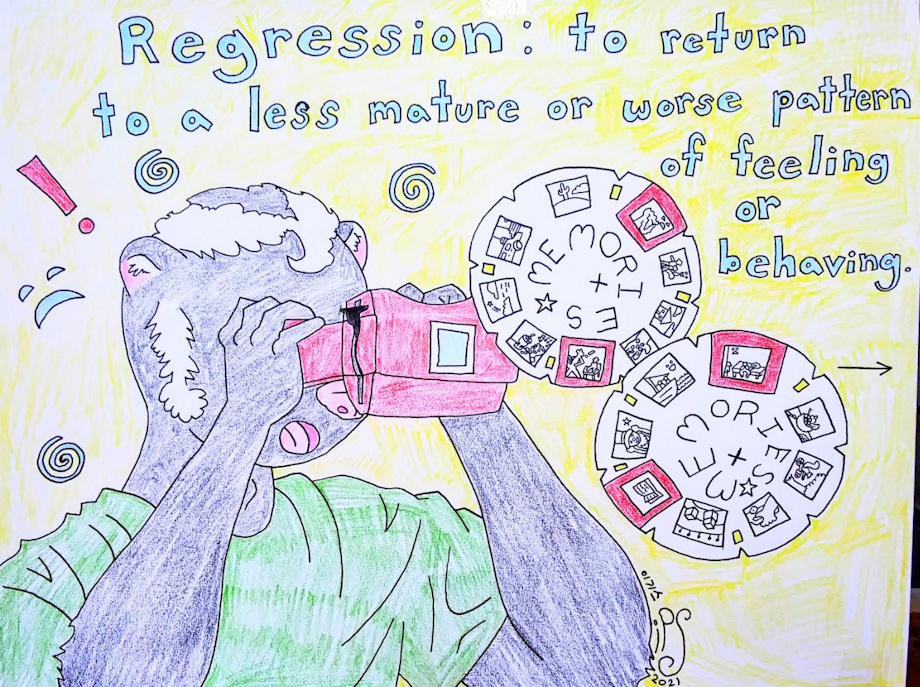Imagine that you are at work, being an adult. Then, out of the corner of your awareness, you see your boss make a seemingly rude comment to a co-worker about their current project. Before you know it, you are a young boy sitting in Mrs. Waterson's class being berated for not turning in your homework. Maybe it brings up the memory of the night before that fateful class day wherein your parents had fought all night, and you had walked in on your mother crying. You remember what it felt like to have your dad yell at your mom like that, and suddenly, in the present moment, your muscles tense. You feel just as helpless as you did on both of those previous occasions, and now that you're in that mindset, you spend the rest of the workday day-dreaming about all of the things that you would like to tell your boss. You're curt with co-workers and distracted from your work. You go home surly, exhausted.
In this scenario, you've likely regressed. According to John Lee, author of Growing Yourself Back Up, Understanding Emotional Regression, "Regression is what happens to us when, emotionally, we leave the present moment." It's something that adults do quite often, and given what we know about brain development, it makes sense. We are creatures of habit, and once a pathway of neurons is built in your mind, it can be easy to access that pathway and to even potentially get stuck operating from there.
Memories are a great tool to learn lessons from, but they are often a poor predictive model. Some memories are more likely to blind us to all that we have become since then.
Like looking through the lenses of the antiquated view-master, we can lose sight of the present while fixating on the little pictures in our heads. We can sometimes be so emotionally overwhelmed by these memories and by paralyzing thoughts of what we would have liked to do in that previous moment that we actually forget the people around us in the present and start projecting those old stories onto them. When this happens, it can be quite helpful to take a moment to realize that the experience that we are remembering is over and that the people involved in this new situation are not the people from our memories. Your boss is not Mrs. Waterson shaming you for not having an assignment done, no more than he is your father, who you maybe would have liked to have had a few choice words with all those years ago. And you are no longer the child who felt so helpless once upon a time.
The next time something upsets you and you find yourself "shaming, blaming, demeaning, demoralizing, criticizing, preaching, teaching, or analyzing" others or situations from a perspective of bygone childishness or from the perspective of trauma, take a deep breath, step back, and see if you are holding a view-master in your mind's eye. Remember: adults always have choices.
Adults are capable of finding and of employing options. Adults build bridges. Regressed adults burn bridges.
Keywords
male
1,250,987,
skunk
35,746,
reference
16,214,
child
12,586,
mustelid
9,741,
mature
6,230,
master
4,469,
stuck
3,231,
regression
2,071,
anger
1,845,
confused
1,683,
sadness
1,494,
view
1,486,
confusion
639,
happiness
623,
90s
602,
childish
500,
trauma
482,
memories
451,
development
432,
pictures
295,
stories
273,
feeling
204,
spinning
202,
less
158,
awe
102,
sticking
99,
psychology
66,
powdercat
61,
remembering
37,
sense
22,
wanderingsnowleopard
19,
behaving
8,
fixated
2,
projecting
2
Details
Published:
4 years, 2 months ago
01 Oct 2021 18:55 CEST
Initial: 5bbcc0e01243cfa87b166d9a8ed12a16
Full Size: 5bbcc0e01243cfa87b166d9a8ed12a16
Large: 1c1b2ecba00c253a8383b79505896403
Small: 05647aeaf8fd6c1442e587a1ccac3304
Stats
33 views
0 favorites
0 comments
